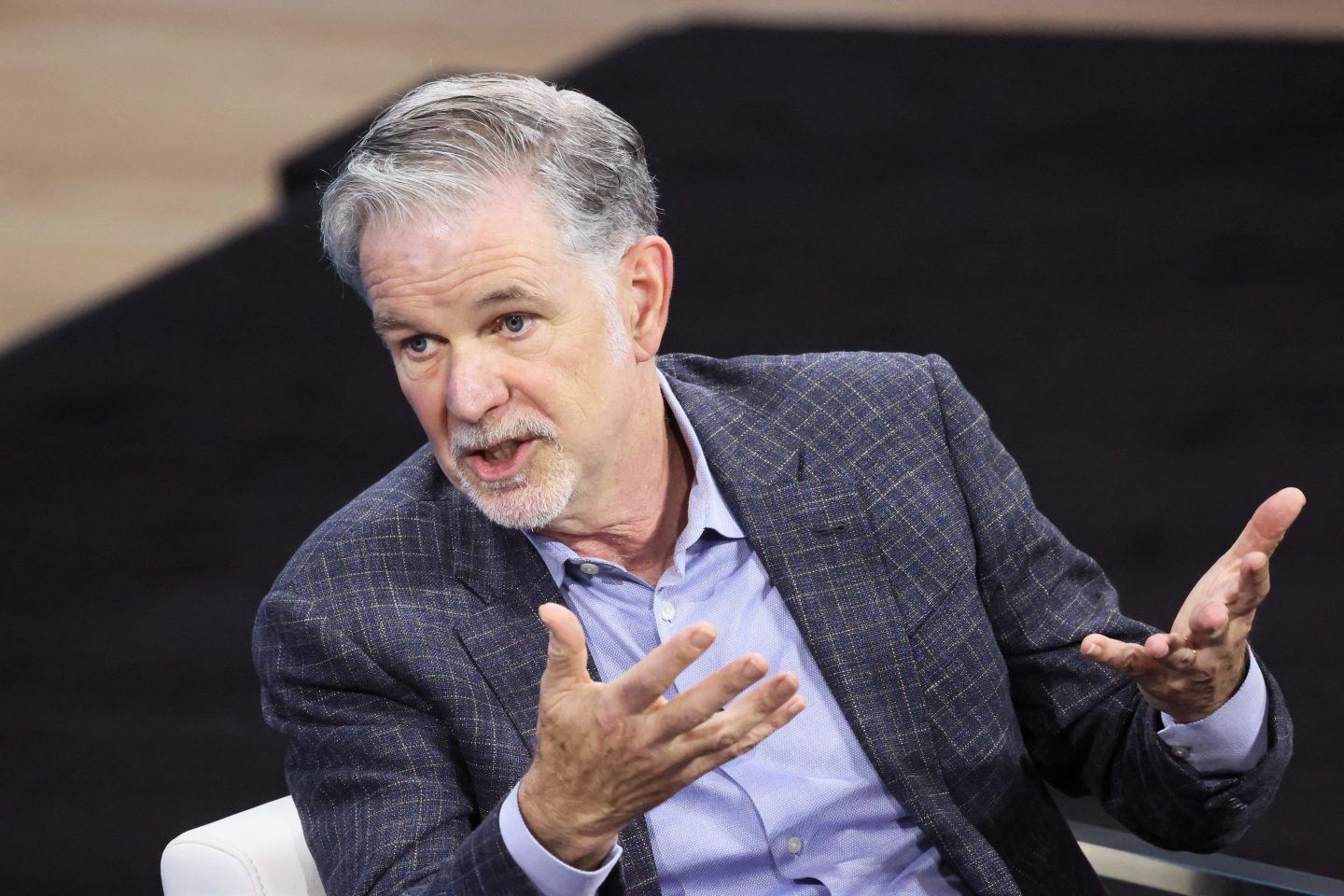As tech leaders across Silicon Valley blasted President Donald Trump’s new $100,000 H-1B visa fee as a threat to innovation, Netflix cofounder Reed Hastings broke ranks, calling it “a great solution.”
In an X post on Sunday, Hastings said he has worked on H-1B politics for three decades and argued the steep cost would reserve visas for “very high-value jobs,” eliminating the lottery and giving employers more certainty.
Hastings’ support is surprising for a few reasons. For one, as one of the biggest Democratic ‘megadonors‘ who is heavily involved with party politics, he rarely endorses any of Trump’s actions and in fact has said the President “would destroy much of what is great about America.”
Secondly, Hastings’ support cuts against the dominant mood in the tech industry, where most companies are alarmed about higher costs and the chilling effect on talent pipelines. Elon Musk, the on-again, off-again ally of the Trump White House, has fiercely criticized the potential changes to the program.
Many local tech leaders have said that the six-figure fee could deal a serious blow to innovation and competitiveness in Silicon Valley. Venture capitalist Deedy Das, a former H-1B holder and partner at Menlo Ventures, warned that the policy undercuts America’s biggest advantage: Its ability to attract global talent.
“If you stifle even that, it just makes it that much harder to compete on a global level,” he told CBS News.
Smaller startups, Das added, could see their financial “runway” shortened by months if forced to absorb the new cost, while some founders say they’ll simply stop sponsoring foreign hires altogether.
What the H-1B is—and what it has become
The H-1B program was created in 1990 to allow U.S. companies to hire foreign workers in “specialty occupations” that require highly technical or professional expertise. Theoretically, it’s meant to bring rare talent – think engineers, doctors, computer scientists and specialized researchers. Each year, Congress caps the number of new visas at 85,000, a number far below demand.
In practice, the program has evolved into something messier. Roughly 70% of visas go to Indian nationals, many not head-hunted by Silicon Valley firms but by outsourcing giants like Infosys, Wipro, and Tata Consultancy Services, many of whom work for some part of the IT sector. Those companies contract out employees to U.S. clients, leading critics—including President Donald Trump—to accuse them of undercutting American workers with lower-wage labor.
Defenders argue the U.S. economy desperately needs these skills and that the visa holders often fill jobs that would otherwise go vacant.
Elon Musk, CEO of Tesla and a one-time staunch supporter of Trump, famously had a Christmas-time bout with the MAGA base over his support for H-1B visas.
“There is a dire shortage of extremely talented and motivated engineers in America,” Musk posted on X. “If you force the world’s best talent to play for the other side, America will LOSE.”
He has said that he, like “many Americans,” is himself here due to the visa.
Confusion, then clarification
Against that backdrop, Trump’s Friday proclamation requiring a $100,000 payment for each new petition sent shockwaves through the tech sector.
Commerce Secretary Howard Lutnick initially said the fee might be annual, fueling panic among employers. By Saturday, the White House clarified: it’s only a one-time payment applied to new petitions in future lotteries, not renewals or re-entries by existing visa holders.
“This is NOT an annual fee,” spokesperson Karoline Leavitt wrote on X.
The clarification calmed some immediate fears, but not the broader unease. Many employers rushed to get their H-1b holders tickets to fly into the U.S. before the fee was enacted. Indian biotech professional Shubra Singh told CNBC that her Saturday dinner in Pittsburgh with H-1B friends was derailed by anxious news alerts that left many rushing to change travel plans.
Economic whiplash in India
The financial reverberations were immediate. Shares of major Indian IT outsourcing firms—including Infosys, Wipro, Tech Mahindra, HCL Technologies, and Tata Consultancy Services—fell between 1.7% and 4.2% on Indian stock exchanges during Monday trading.
Citi Research said in a note that the fee could shave about 100 basis points from margins and cut earnings per share across the IT sector by roughly 6% if companies continue staffing through H-1Bs. Analysts, including JP Morgan’s Toshi Jain, also predict fewer Indian students may choose U.S. universities if the post-graduation visa route now carries a six-figure price tag.
Yet some see opportunity. Accel partner Prashanth Prakash said the disruption could redirect top graduates toward India’s startup ecosystem.
“If Indian talent no longer heads to the U.S., it could be a boon for local entrepreneurship,” he argued.
SquadStack CEO Apurv Agrawal told the Economic Times of India the H-1B fee turmoil is pushing Indian professionals to see India itself—not the U.S.—as the ultimate destination for world-class talent.
“With the kind of AI-first companies and global-scale opportunities being built here today, we have a once-in-a-generation chance to retain and welcome back world-class talent,” Agrawal said.












